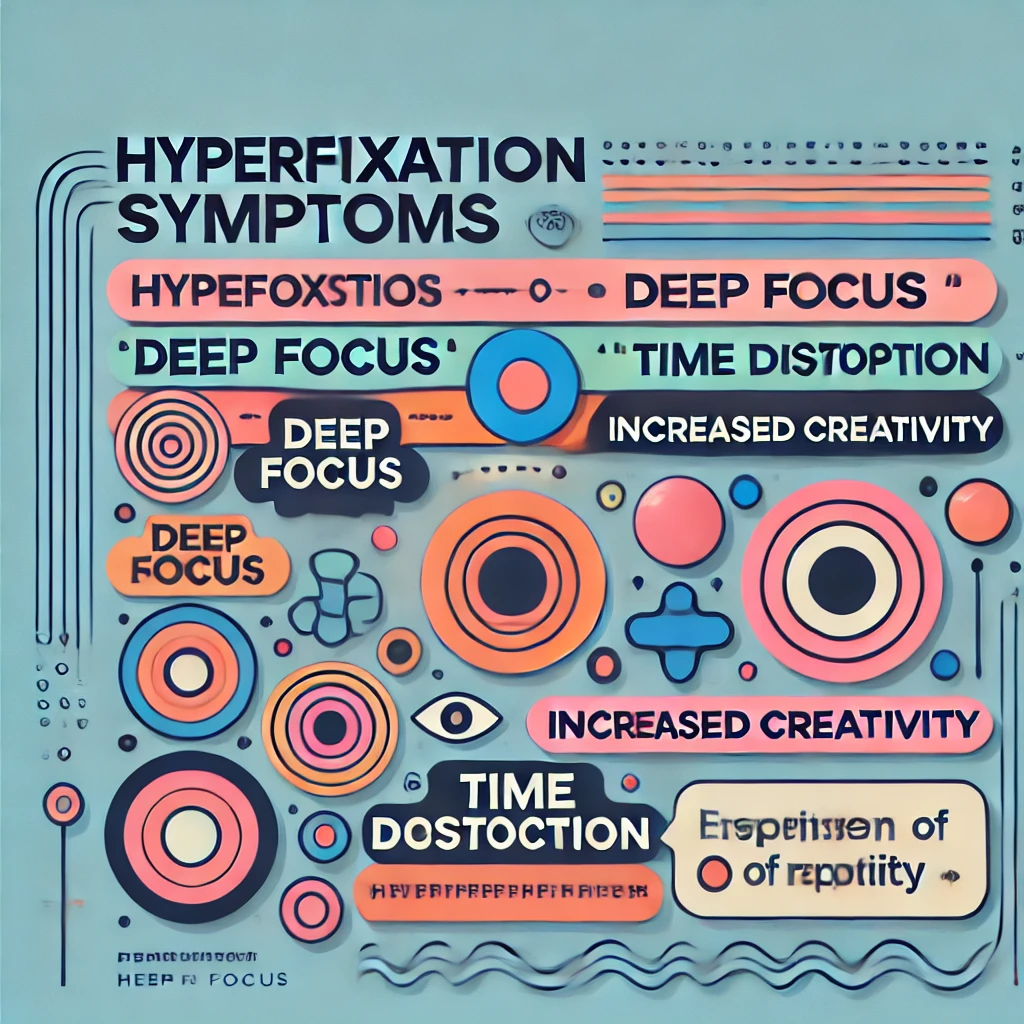Hyperfixation is a magnetic phenomenon. It makes people deeply focused on something. The time they stay focused can be short or very long.
Understanding hyperfixation is key. It helps us see how our brains work and how we engage with the world.
This article looks into hyperfixation’s details. We explore how long it lasts, what happens in the brain, and what affects its duration. By learning about this, we can help people with hyperfixation. This can improve their life and work.
Hyperfixation: Definition and Basic Concepts
Hyperfixation is when someone gets really into one thing. It’s like being focused on something. This can make them forget about other parts of their life.
Common Signs and Characteristics of Hyperfixation
People with hyperfixation show certain signs. They include:
- They focus hard on one thing.
- They can’t stop thinking about it, even when they should be doing other things.
- They feel very connected to it.
- They spend too much time on it.
- They find it hard to switch to something else.
Differentiating Between Hyperfixation and Normal Interest
Having strong interests is normal. But hyperfixation is different. It takes over someone’s life, making it hard to balance work and play. Knowing the difference is key to handling it.
The Science Behind Hyperfixation and Brain Function
Hyperfixation is linked to autism spectrum disorder. It has a deep connection to how our brains work. Scientists have found interesting facts about this intense focus.
Research shows that hyperfixation is tied to the brain’s reward and attention areas. When someone gets really into something, their dopamine system kicks in. This makes them feel good and want to keep doing it.
Also, hyperfixation might affect how well we can switch tasks. People who get really focused might find it hard to stop and start something new. This shows they might struggle with changing their focus.
“Hyperfixation is a complex phenomenon that reflects the interplay between cognitive, emotional, and neurological factors.”
How long and intense hyperfixation lasts can vary a lot. It might depend on genetics, what’s around us, and our life experiences. Learning about hyperfixation helps us understand people with autism better.
 alt=”Hyperfixation brain function” data-id=”147948366″ />
alt=”Hyperfixation brain function” data-id=”147948366″ />
As scientists keep studying, they hope to learn more about hyperfixation. They want to find ways to help people who face challenges but also get benefits from this unique brain function.
How Long Do Hyperfixations Last: Typical Duration Patterns
Hyperfixations are when you focus on something for a long time. They can last from a few hours to weeks or months. Knowing how long they last is important for managing them.
Short-term Hyperfixation Episodes
Some people have hyperfixations that last a few days. These episodes start suddenly and grab your full attention. You might spend hours on it, ignoring everything else.
Long-term Hyperfixation Experiences
Others have hyper fixations that last longer, sometimes months. They dive deep into their interests, always looking for more. This can change their daily life a lot.
Many things can affect how long hyperfixations last. This includes your personality, the topic you’re interested in, and if you have autism. Knowing this can help you and your loved ones deal with hyperfixations better.
“Hyperfixations can be both a blessing and a curse, with the intensity of focus providing a sense of deep engagement and fulfillment, but also the potential for disruption to daily routines and relationships.”
Factors That Influence Hyperfixation Duration
How long a hyperfixation lasts can change a lot from person to person. Many things can affect this. Knowing these can help us understand why some how long does an average hyperfixation last? and others go on for a long time.
Personal traits and psychology play a big role. Things like anxiety, stress, and mood can change how long a hyperfixation lasts. People with autism hyperfixations might see different lengths because of their brain and thinking patterns.
“Hyperfixations can be both a blessing and a curse, as they can provide intense focus and productivity, but also disrupt daily routines and relationships if they become all-consuming.”
What’s around us can also affect how long a hyperfixation lasts. If we can easily find what we’re fixated on, it might last longer. But if it’s hard to find, it might not last as long.
How new and challenging something is can also matter. Things that are very interesting and hard to do keep us focused longer. But simple tasks don’t keep us as interested for as long.
Knowing what affects how long hyperfixations last can help us manage them better. It helps keep a balance between being productive and feeling good overall.
The Connection Between Autism and Hyperfixation Length
People with autism often get really into one thing for a long time. This is called hyperfixation. The length of these fixations can be different from others.
Common Patterns in Autistic Individuals
Research shows autistic people stay focused longer than others. Their fixations can last for weeks, months, or even years. They dive deep into what they love.
There are many reasons why autistic people might stay focused longer. They often like details a lot. They also like routine and getting really into special interests. These traits help them stay focused.
Supporting Healthy Fixation Patterns
Even though long fixations can be fun, it’s key to keep them balanced. We can help by making sure they have time for everything. We can also teach them new things and ways to handle their focus.
Knowing how autism and focus work together helps us support them better. We can help them enjoy their interests without getting too caught up.
Managing Extended Hyperfixation Periods
Hyperfixations are when someone focuses really hard on one thing for a long time. They can be very rewarding but need to be managed to keep life balanced. Here are some ways to handle these long periods of focus.
Establish Boundaries and Routines
It’s key to know how much time and energy to give to the hyper fixation. Make a routine with breaks, meals, and other activities. This stops the hyperfixation from taking over your life.
Engage in Mindfulness Practices
Mindfulness, like meditation or deep breathing, helps keep things in perspective. It stops the hyperfixation from taking over. These practices help you notice your thoughts and feelings better.
Seek Support from Loved Ones
Talking to friends and family about your hyperfixation is very helpful. They can offer support and help you stay on track. Working together with them can make a big difference.
Diversify Your Interests
It’s important to have other interests and activities besides the hyperfixation. Doing other hobbies, meeting people, or exercising helps keep things balanced. This stops the hyperfixation from controlling everything.
Using these strategies can help you manage long hyperfixation periods better. This leads to a healthier and happier life. Remember, how long hyperfixations last can vary, but with the right steps, you can handle them well.
Impact of Hyperfixation on Daily Life and Relationships
Hyperfixation is when you really focus on one thing for a long time. It can change your daily life and how you connect with others. Knowing how it works is key to living a happy and balanced life.
Professional Impact
At work, hyperfixation can be good and bad. It can make you very productive and do great work. People with hyperfixation pay close attention and work hard.
But, it can also cause problems. It might make you ignore other important tasks. You might struggle to keep up with changes and forget about your personal life. This can hurt your job and relationships with coworkers.
Personal Relationship Effects
Hyperfixation also affects your personal life. It can make it hard to spend time with family and friends. They might feel ignored and upset.
Also, your intense focus can make it hard for others to understand you. This can make relationships harder. Partners, family, and friends might feel left out.
Finding a balance is important. Enjoy the good parts of hyperfixation like being passionate and productive. But also work on managing it to keep your life and relationships healthy.
Conclusion
Understanding hyperfixations is key for everyone. They can last from a few minutes to a long time. Many things can change how long they last.
Hyperfixations happen to people with autism and those without. It’s important to know when they are good and when they are not. If they start to hurt your life or relationships, get help.
Hyperfixations can be good, like learning a lot or working hard. But, they can also be hard. Knowing how long do hyperfixations last and how they relate to autism can help. It helps people live a balanced life.
FAQ
What is a hyperfixation and how long do they typically last?
A hyperfixation is when you focus really hard on something. It can last from a few days to months. Some last short, others longer, based on many things.
How long does an average hyperfixation last?
There’s no set time for hyperfixations. They can last from days to months. It depends on the person and what they’re interested in.
Are hyperfixations common in individuals with autism?
Yes, people with autism often have hyperfixations. These are deep interests that take up a lot of their time. They’re a big part of who they are, but can also affect daily life.
What factors influence the duration of a hyperfixation?
Many things can affect how long a hyperfixation lasts. This includes who you are, what you’re interested in, and your environment. Things like stress and support from others also matter.
How can I manage extended hyperfixation periods?
To handle long hyperfixations, find a balance. Set time for your focus and also for yourself and others. Getting help from friends or a therapist can also be key.




